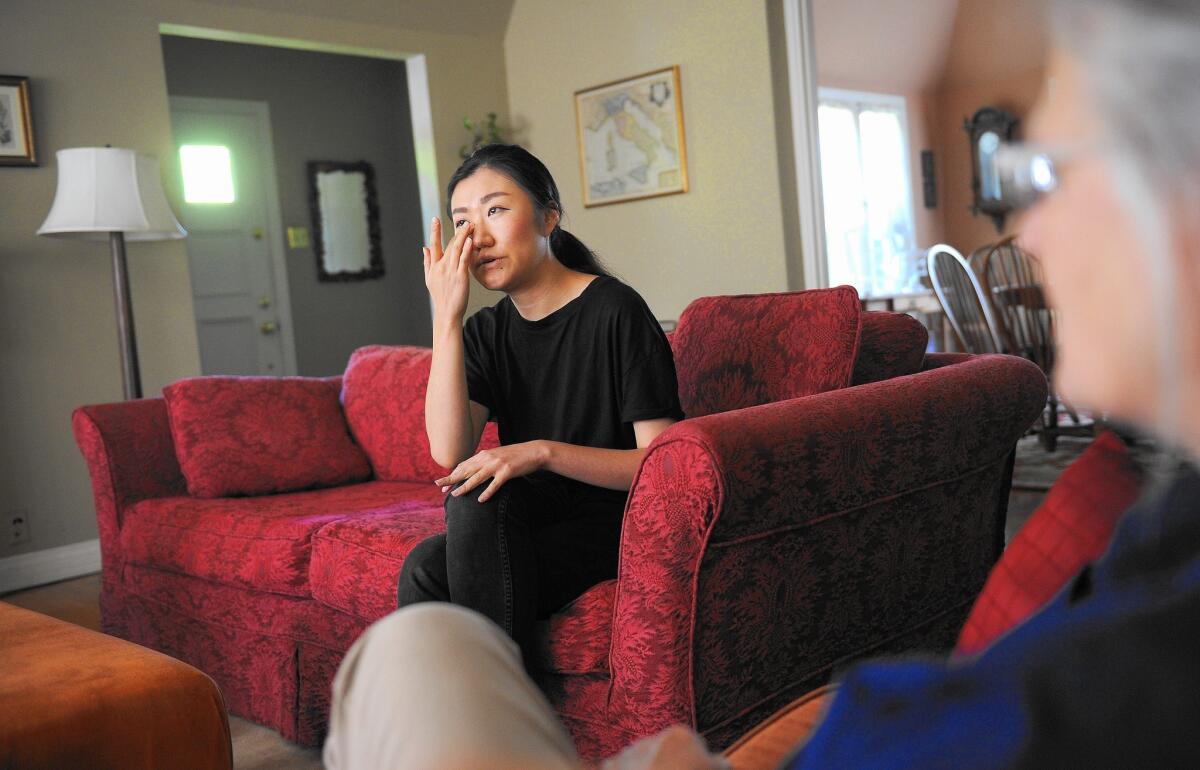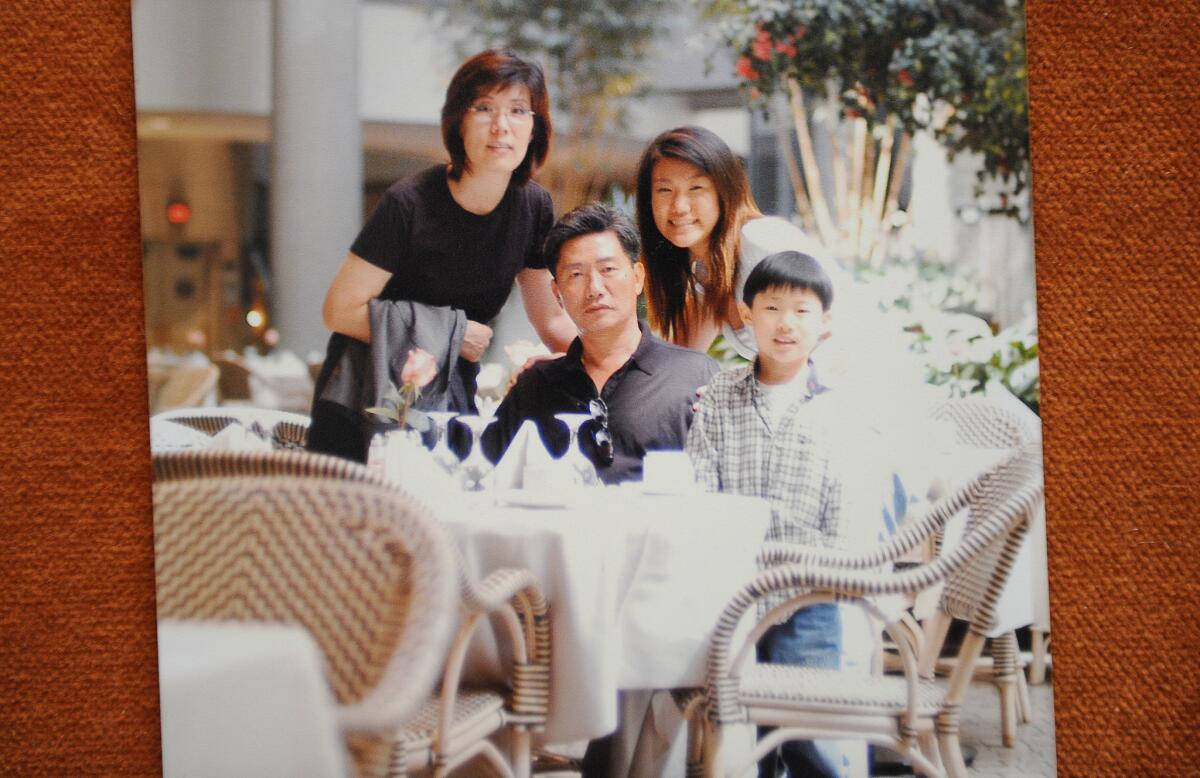Don’t think of the lone survivor of her father’s murder-suicide as ‘that poor girl’

- Share via
Binna Kim stood atop a desk holding a microphone.
The assignment for this storytelling class in Queens, N.Y., was to tell a personal travel story in less than four minutes.
One student talked about backpacking in India. Another described a night at a seedy motel.
Binna cleared her throat and started the story of her journey from Los Angeles to New York — a 2,500-mile trip that took a decade.
It began on an April evening in 2006, when she was just 16.
She had been begging her parents to let her go. Her mother had said no, but her father relented. She made plans to meet a friend to go to the airport.
She never made her flight.
“There was an accident,” she said.
Binna did not tell her classmates the details: how her father shot her mother, her 8-year-old brother and her in their Echo Park apartment, before turning the gun on himself; how only she survived.
As much as all that has come to define her, she doesn’t speak of it.
She’s determined to piece together adulthood on her own, without anyone thinking, “That poor girl.”
::
Binna described that attempt at storytelling while in Los Angeles for this week’s 10th anniversary of the private tragedy that became glaringly public, making headlines and shocking the Korean community.
It had been the third murder-suicide by a Korean father beleaguered by financial troubles in Southern California in barely a week. Scrutiny and soul-searching followed.
Was it a symptom of Korean patriarchy, or were undiagnosed and untreated mental health problems to blame? Perhaps something about the hardscrabble immigrant psyche led to the tragedies? Or did the Korean language, which calls what happened “communal suicide” rather than murder, have something to do with it?
Editorials and columns in Koreatown papers ran through myriad theories, with no satisfying answers. People flocked to forums, town halls and prayer groups.
Meanwhile, at County-USC Medical Center, Binna, the sole survivor, floated in and out of consciousness, heavily sedated on morphine.
The bullet that fragmented behind her ear had temporarily paralyzed her left side and caused her face to droop on the right side. When she came to, she thrashed about and tried to rip out her IV tubes, confused about what had happened.
Her eighth-grade English teacher, Annie Costanzo visited the hospital with one of Binna’s teachers. She found the girl she remembered vaguely from her junior high class tied to the hospital bed.
Costanzo started visiting regularly. At first, she tried reading her material from Binna’s 10th-grade English class. But none of it seemed to register.
She instead picked up pen and paper and told Binna to let out what was on her mind, keeping a journal on her behalf.
Binna’s thoughts were dominated by what people must be thinking and saying about her father.
Everyone was furious at Sang Kim, who left a letter to his pastor saying that he intended to take his own life because of financial troubles. People thought Binna should be as angry, if not angrier, than they were.
To her, it was apparent that her father had done what he did out of love.
::
In six months, after intensive rehab, Binna was slowly ambling through the hallways of the Los Angeles Center for Enriched Studies on her own two legs.
She clung to normalcy as best as she could. She ran for student council and became senior class secretary. She gossiped and shopped with her close group of friends, and went to prom in a gray Anthropologie dress.
She applied to colleges and got accepted to Loyola Marymount University. She knew it would have made her parents proud. Neither had attended college, and her father had been adamant that she go.

Binna Kim, second from right, in a photograph with her parents and her younger brother.
At LMU, she was determined not to tell a soul what had happened, even if signs of it marked each limping step, every asymmetrical smile.
Almost immediately, she began to struggle. She was deeply self-conscious about her appearance and insecure about her gait as she walked across the sprawling campus.
Costanzo started frequenting the school just to hold Binna while she sobbed.
She eventually persuaded the girl to ask for help — for rides to class and a little extra time on tests.
When Binna seemed to need it most, Costanzo gave the girl the journal she’d kept in the hospital, to remind her of the determination and optimism she’d held on to in her darkest moments.
Binna started opening up to a couple friends and feeling more at home. She got a job working in the school’s communications office, and then a coveted $12-an-hour position in the school mail room.
In 2012, she graduated with a degree in communications, having made the Dean’s List her last three semesters. Under her graduation gown, tattooed on her right shoulder, was Romans 5:3-4: “We also glory in our sufferings, because we know that suffering produces perseverance; perseverance, character; and character, hope.”
::
“The accident” now feels at once like yesterday and a distant, faded past, Binna says. Sometimes she breaks out into a cold sweat, when the feeling hits that her family never existed at all.
Increasingly, she recognizes her parents in herself. She’ll spend hours alone at a museum lost in her thoughts, the way her father used to do at the beach. She’ll retreat from her friends for periods, as her mother did.
She urges Korean friends to have deep conversations with their parents before it’s too late. Whenever they talk to her about their disconnect with their first-generation immigrant parents, she thinks of her father, and the weight he must have carried inside without anyone to talk to.
Last November, she posted a photo of her brother on her Instagram account. It was a reminder to her friends, but most of all to herself, that he existed. By now, he’d be a pimply teenager, but in her memory he’s suspended in childhood.
She doesn’t have any memories of the shooting, but she still finds herself picturing her dad with the gun, pointed at her brother.
The thoughts of his last moments have haunted her. He was found under his bed. Did he suffer? Was he frightened? Could she have saved him if she had heard the first shots?
She felt her family’s absence with each milestone she hit: Her first job out of college, as an administrative coordinator at a health and wellness company; getting admitted to graduate school for advertising in New York last December; finally achieving the decade-long dream of moving there. She carries them close to heart, having tattooed their initials on her left rib cage a couple of years ago.
Costanzo puts the milestones in perspective: “Don’t tell Binna she can’t do anything.”
On Saturday, she went out to Rose Hills, where her family is buried, to mark the anniversary. She carefully picked out French tulips, sunbeams, ranunculuses, irises and snapdragons.
As always, seeing their names engraved in stone made their deaths all the more real and permanent, reminding her how keenly she misses them — a pining that she turns to a poetic Korean word to convey:
“Geu-ri-wo.”
ALSO
Adelanto’s baseball dream turns into a $1-a-year nightmare
Social workers charged with child abuse in case involving torture killing of Gabriel Fernandez
Man shot and stabbed woman, then texted photo of her corpse to her boyfriend, prosecutors say
More to Read
Sign up for Essential California
The most important California stories and recommendations in your inbox every morning.
You may occasionally receive promotional content from the Los Angeles Times.











